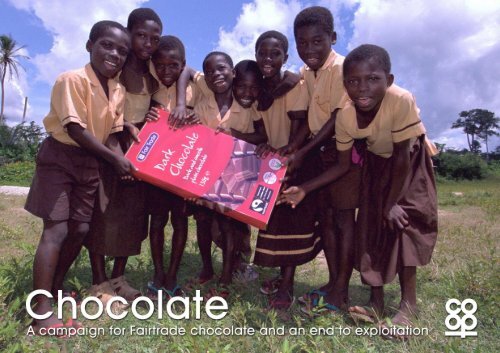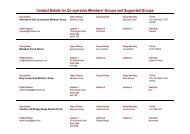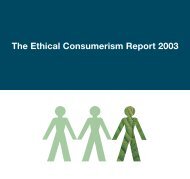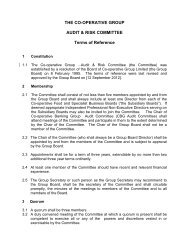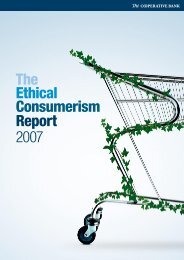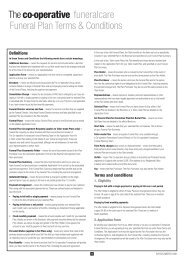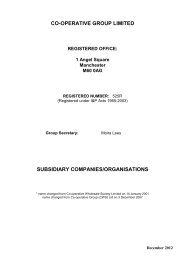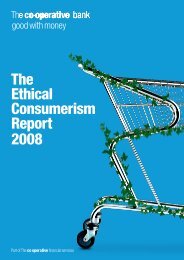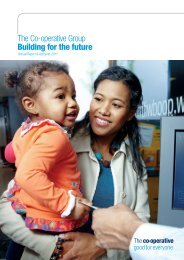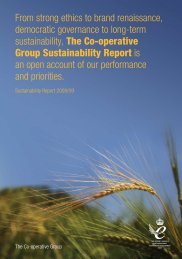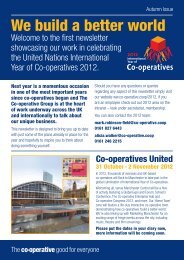Chocolate Report PDF - Fair Trade Barrie
Chocolate Report PDF - Fair Trade Barrie
Chocolate Report PDF - Fair Trade Barrie
You also want an ePaper? Increase the reach of your titles
YUMPU automatically turns print PDFs into web optimized ePapers that Google loves.
Just about everyone<br />
loves chocolate.<br />
But the way chocolate makers source its prime<br />
ingredient can leave a very nasty taste in the<br />
mouth. The cocoa growers of West Africa are<br />
amongst the most exploited workers in the world.<br />
Happily, we in the UK can make a sustained<br />
difference to their lives straight away, simply by<br />
switching to fairly-traded chocolate. How easy is<br />
that?<br />
Linda Gilroy MP
Executive summary<br />
In the rich cities of the West, the battle rages on.<br />
On one side are the world’s biggest<br />
companies, who have built vast<br />
empires on the back of global trade.<br />
Ranged against them, angry protestors<br />
who believe these companies are<br />
bleeding the developing world dry.<br />
Meanwhile, in the developing world,<br />
the growers that feed the West struggle<br />
for life. Aside from moving to towns or<br />
cities and joining the mass of slum<br />
dwellers working for pitiful wages in<br />
factories and so on, often their only<br />
means of improving their standard of<br />
living is to grow cash crops for export -<br />
bananas, tea, mangoes, coffee or<br />
cocoa. Yet the return they get is both<br />
low and extremely insecure, because<br />
of the volatility of commodity prices<br />
on world markets.<br />
According to Oxfam and others with<br />
links to the developing world, things will<br />
only improve if there is a structural<br />
change that will give small-scale growers<br />
more muscle in their negotiations with<br />
powerful multinationals, such that they get<br />
a fair and stable price for their produce.<br />
<strong>Fair</strong>trade was set up precisely to<br />
achieve this. It has made a massive<br />
difference to the communities it serves<br />
by cutting out exploitative middlemen<br />
and dealing direct with growers.<br />
<strong>Fair</strong>trade pays a stable basic price<br />
guaranteed to cover the full social<br />
cost of production, which is usually well<br />
above the market rate, and also a social<br />
premium on top of the basic price for<br />
investment in community projects.<br />
<strong>Fair</strong>trade, which has been supported<br />
by the Co-op more than any other<br />
retailer, continues to grow, but the<br />
<strong>Fair</strong>trade revolution will not happen<br />
until it is taken out of the niche and<br />
brought into the mainstream.<br />
This is what the Co-op is now setting<br />
out to achieve. The Co-op is switching<br />
the supply of the cocoa used in all Co-op<br />
brand block chocolate to <strong>Fair</strong>trade<br />
cocoa. We are calling on other retailers<br />
to follow our lead in their own-label<br />
chocolate blocks. We are calling on<br />
chocolate manufacturers to launch at<br />
least one product with the FAIRTRADE<br />
Mark in their range.<br />
Why chocolate? The Co-op will continue<br />
to stock and increase sales of other<br />
<strong>Fair</strong>trade lines, such as bananas, tea,<br />
coffee and mangoes and to introduce<br />
new <strong>Fair</strong>trade products. But we have<br />
chosen chocolate as the focus for<br />
making <strong>Fair</strong>trade mainstream because<br />
of the stark - even obscene - contrast<br />
between the pleasure derived from<br />
eating it and the suffering that goes<br />
into making it.<br />
Ninety per cent of the chocolate<br />
consumed in this country is made from<br />
West African cocoa. Where <strong>Fair</strong>trade is<br />
not present, growers are often exploited<br />
and cheated by unscrupulous middlemen.<br />
More disturbing still, West African<br />
cocoa plantations have been found to<br />
use slave labour, children who have<br />
been sold by poor families and trafficked<br />
into a life of misery.<br />
Cocoa production is dominated by<br />
small-scale growers, which leaves<br />
them particularly vulnerable. When they<br />
join together, grower co-operatives<br />
can play an important part in helping<br />
them derive the benefits of integration<br />
and solidarity.<br />
The co-operative that will supply our<br />
<strong>Fair</strong>trade cocoa - Kuapa Kokoo in<br />
Ghana - is a shining example of what<br />
can be achieved. In just 10 years it has<br />
grown from nothing to producing one per<br />
cent of the world’s entire cocoa supply.<br />
The <strong>Fair</strong>trade contribution has already<br />
made a difference to the lives of the<br />
growers. Now, with the Co-op’s new<br />
contract for <strong>Fair</strong>trade cocoa, they<br />
can look forward to improved health,<br />
education, water supplies, stability<br />
and investment for the future.<br />
Pa pa paa! is Kuapa Kokoo’s slogan,<br />
chant and greeting - it means ‘best of<br />
the best’. A key reason for choosing<br />
Kuapa Kokoo as our supplier is that they<br />
make probably the highest quality cocoa<br />
in West Africa - and therefore the world.<br />
We believe that the resulting quality and<br />
taste will be paramount in persuading<br />
consumers to choose the <strong>Fair</strong>trade<br />
alternative to their normal brand.<br />
Consumers can make a difference<br />
simply by buying and enjoying <strong>Fair</strong>trade<br />
chocolate. They can also join our<br />
campaign to persuade UK retailers<br />
and chocolate manufacturers to<br />
source at least some <strong>Fair</strong>trade cocoa.
Contents<br />
1 Globalisation: a dirty word? 4<br />
2 The <strong>Fair</strong>trade experience 6<br />
3 The case for cocoa 10<br />
4 Pa pa paa! 12<br />
5 Join our campaign 15<br />
6 About the Co-op 16<br />
Acknowledgements 17
1<br />
Globalisation: a dirty word?<br />
PHOTOGRAPHY: Brian Moody<br />
Globalisation: the exploitation by the<br />
affluent West of the Third World poor?<br />
The pillage by greedy multinationals<br />
of the labour and natural resources<br />
of people who have insufficient clout<br />
to negotiate a better deal? Or the<br />
only hope for a better life for millions<br />
in developing countries?<br />
Oxfam and many other development<br />
organisations believe trade can play a<br />
vital part in poverty reduction when<br />
the right conditions are met. <strong>Trade</strong> can<br />
equally be hugely damaging for poor<br />
people if it undermines their livelihoods<br />
by destroying their markets or ruining<br />
their environment.<br />
In the foreword to the Oxfam report<br />
on trade, globalisation and the fight<br />
against poverty,‘Rigged Rules and<br />
Double Standards’, Oxfam’s honorary<br />
president and Nobel Economics<br />
Laureate, Amartya Sen, writes:<br />
“Global interaction, rather than<br />
insulated isolation, has been the basis<br />
of economic progress in the world.<br />
<strong>Trade</strong>...has helped to break the<br />
dominance of rampant poverty and the<br />
pervasiveness of ‘nasty, brutish and short’<br />
lives that characterised the world.”<br />
But the report identifies a crucial paradox<br />
of global trading - that at the same time<br />
as being a source of unprecedented<br />
wealth, millions of the world’s poorest<br />
people are being left behind.<br />
“World trade has the potential to act<br />
as a powerful motor for the reduction<br />
of poverty, as well as for economic<br />
growth, but that potential is being lost.<br />
The problem is not that international<br />
trade is inherently opposed to the<br />
needs and interests of the poor, but<br />
that the rules that govern it are rigged<br />
in favour of the rich.”<br />
The report analyses the rules governing<br />
world trade and puts forward Oxfam’s<br />
policy goals for correcting the balance<br />
between the extremes of western<br />
prosperity and of third world poverty, in<br />
launching its ‘Make <strong>Trade</strong> <strong>Fair</strong>’ campaign.<br />
The Co-op fully supports Oxfam’s<br />
position that the right path is not one<br />
of ‘no trade’, but of ‘fair trade’.<br />
Although long committed to a<br />
responsible retailing policy in our<br />
relationships with customers and<br />
suppliers, the Co-op does not believe<br />
in product boycotts.<br />
Supermarket brands are particularly<br />
anonymous and are often supplied<br />
by major companies. The Co-op is<br />
determined to make this relationship<br />
more transparent. The choice of<br />
supplier is crucial, if retailer and customer<br />
want to make a real difference to the<br />
livelihood of that supplier.<br />
Products like bananas and mangoes,<br />
fruit juices, tea, coffee, cocoa and<br />
many more are sourced entirely or in<br />
part from growers in the Third World.<br />
4
Conditions vary depending on country, region and produce, but there<br />
are five common characteristics.<br />
Growers tend to be:<br />
subject to massive fluctuations in the price they receive for their<br />
produce, caused by the speculation of commodity traders<br />
in New York and London<br />
dominated by local or regional wholesalers, who are often<br />
profiteering middlemen<br />
disparate, small scale and remote - many living on subsistence levels,<br />
with little or no money to invest in improvements<br />
dependent on crops that are labour intensive and use<br />
low-technology means of planting, crop protection and harvesting<br />
exposed to climatic conditions that drastically affect<br />
quantity and quality of crop.<br />
The combination of these factors makes growers weak and vulnerable. When<br />
prices fall, growers are faced with uncomfortable choices: they want to send<br />
their children to school but they cannot afford the books or uniforms. They need<br />
the support of all members of the family, but they cannot afford medicine to<br />
keep their family well.<br />
Food self-sufficiency becomes the first goal of survival, which can lead to the<br />
neglect of the cash crop, especially where the price they get for selling it is less than<br />
the cost of producing it. If things get worse, even basic expenditure on food will<br />
need to be cut, weakening growers’ capacity for productive work and leaving<br />
them vulnerable to health problems.<br />
PHOTOGRAPHY: Brian Moody<br />
As a retailer we can make a difference through our choice of supplier and<br />
the conditions of supply. And we can provide moral support for producers,<br />
in the knowledge that they are being supported by a major retailer.<br />
We can offer a decent and - equally as important - stable price<br />
for their produce<br />
We can shorten the supply chain, by cutting out exploitative<br />
middlemen and dealing more directly<br />
We can reduce fragmentation by encouraging the development<br />
of co-operatives, bringing economies of scale, mutual support<br />
and more negotiating muscle.<br />
Perhaps the best example of this is the <strong>Fair</strong>trade initiative, on which the<br />
Co-op has a unique track record, and which it has supported more than any<br />
other retailer since its inception.<br />
5
2<br />
The <strong>Fair</strong>trade experience<br />
PHOTOGRAPHY: Brian Moody<br />
<strong>Fair</strong>trade is a practical way of helping<br />
growers establish themselves in the<br />
world supply chain. It is not charity,<br />
but a sensible commercial practice<br />
that emphasises human values.<br />
<strong>Fair</strong>trade guarantees a better deal<br />
for growers in developing countries.<br />
These people have often found that<br />
because of their remoteness or size of<br />
operation they are unable to obtain a<br />
fair price for their products. They have<br />
been marginalised by international<br />
trading and have often been vulnerable<br />
to unscrupulous middlemen.<br />
The <strong>Fair</strong>trade Foundation awards an<br />
independent consumer guarantee -<br />
the FAIRTRADE Mark - to individual<br />
products which meet <strong>Fair</strong>trade criteria<br />
regarding terms of trade and conditions<br />
of production. <strong>Fair</strong>trade helps<br />
disadvantaged growers work together<br />
in community enterprises, by offering<br />
a guaranteed better price - one that<br />
covers the cost of production and a<br />
basic living wage.<br />
Furthermore, it ensures that money<br />
paid for the products goes direct to<br />
the producers’ organisations. <strong>Fair</strong>trade<br />
buyers often provide pre-payment so<br />
that producers can avoid getting into<br />
insupportable debt, as well as offering<br />
a guaranteed minimum price, which is<br />
above the market norm and at least<br />
covers the cost of production and a<br />
basic standard of living.<br />
Importantly, <strong>Fair</strong>trade pays an additional<br />
‘social premium’, under which some<br />
of the price paid is reinvested in the<br />
business or spent on social development<br />
programmes, such as education and<br />
health. The producers themselves<br />
decide democratically how to invest this<br />
extra income, making co-operation,<br />
participation and joint responsibility of<br />
key importance.<br />
<strong>Fair</strong>trade has the potential to make a<br />
significant difference to the economic<br />
welfare of a community. In the case of<br />
cocoa, for example, prices have followed<br />
a boom and bust cycle over the past<br />
30 years, with peak prices in the late<br />
1970s and a slump in the early 1990s.<br />
A brief recovery in 1997-98 was followed<br />
by a steep decline in which prices fell<br />
to a 27-year low of $714 per tonne in<br />
November 2000. Prices in 2000 averaged<br />
$887 per tonne, barely half of the<br />
average figure during the past 30 years.<br />
Although prices on the current market<br />
are unusually high, in reality the ordinary<br />
small-scale grower may never receive the<br />
true value of his cocoa, as the benefit<br />
of raw material price increases may go<br />
to commodity traders and middlemen.<br />
And, as one farmer puts it, prices<br />
could “drop down to hell again at any<br />
moment”. It is this uncertainty and<br />
instability that is problematic for the<br />
ordinary grower.<br />
The minimum <strong>Fair</strong>trade price for cocoa<br />
is $1600 per tonne, plus the social<br />
premium of $150 per tonne to be used<br />
for democratically-agreed business or<br />
social development programmes. If the<br />
world market price rises to $1600 per<br />
tonne or more, then the <strong>Fair</strong>trade<br />
price is the world market price, plus<br />
the $150 premium.<br />
The Co-op is based on values of selfhelp,<br />
self-responsibility, democracy,<br />
equality, equity and solidarity. One of<br />
our principles is co-operation between<br />
co-operatives, so it is natural that we<br />
should support <strong>Fair</strong>trade, as many of<br />
these disadvantaged groups are small<br />
producer co-operatives.<br />
6
Co-op track record on <strong>Fair</strong>trade<br />
The Co-op...<br />
stocks <strong>Fair</strong>trade products in more outlets than any other retailer<br />
sells <strong>Fair</strong>trade tea, coffee and chocolate - even in its smallest<br />
convenience and community stores<br />
was the first supermarket to promote <strong>Fair</strong>trade produce through<br />
TV commercials - just one element of the Co-op’s extensive<br />
marketing support<br />
launched the UK’s first <strong>Fair</strong>trade bananas<br />
was the first retailer to launch an own-brand FAIRTRADE Mark<br />
product - Co-op <strong>Fair</strong> <strong>Trade</strong> Divine Milk <strong>Chocolate</strong>, followed by<br />
Co-op <strong>Fair</strong> <strong>Trade</strong> Divine Crispy White <strong>Chocolate</strong><br />
builds awareness of <strong>Fair</strong>trade via its members with activities<br />
such as tastings, leafleting and conference events<br />
launched the first supermarket own-brand <strong>Fair</strong>trade coffee<br />
- Co-op <strong>Fair</strong> <strong>Trade</strong> Roast and Ground Coffee, followed by Co-op<br />
<strong>Fair</strong> <strong>Trade</strong> Instant Coffee Granules - another supermarket first<br />
was the first retailer to launch fairly-traded red and white wine<br />
introduced the world’s first <strong>Fair</strong>trade mango (available seasonally)<br />
diversified the offering by producing the UK’s first supermarket<br />
<strong>Fair</strong>trade chocolate cake, using <strong>Fair</strong>trade sugar and cocoa.<br />
How <strong>Fair</strong>trade helps banana growers in Ecuador<br />
Ana and José are banana farmers at El Guabo in Ecuador. They are married<br />
with three children. José has a passion for healthy farming. <strong>Fair</strong>trade<br />
insists on limiting the use of chemicals, and he approves of this policy:<br />
“After all, we eat the bananas ourselves.” But he says it would be more<br />
difficult to sustain this practice without the higher price paid by <strong>Fair</strong>trade.<br />
“Other companies don’t care whether we use chemicals or not. The chemicals<br />
make the crop grow quickly at first, but then the soil degenerates. We<br />
farmers need to know this, so we can preserve the nature around us.”<br />
Ana gets up at 6am, though on harvest days she’ll get up at 4am. She<br />
starts the day by preparing traditional Ecuadorian food: herb tea, yucca,<br />
green bananas, boiled maize. Like other local banana growers, their weekly<br />
work consists of plant irrigation, pruning, pest prevention and harvesting<br />
the crop. Both of them were born in the uplands of Ecuador. José was<br />
originally a carpenter. They moved to the coast 10 years ago to be near<br />
Ana’s family and bought a small piece of land. Ana and José own two<br />
hectares of land each.<br />
Ana and José found out about <strong>Fair</strong>trade through a friend and joined the El<br />
Guabo banana co-operative. El Guabo, a group of about 100 small farmers,<br />
is one of only two suppliers of <strong>Fair</strong>trade bananas from Ecuador. However,<br />
there is not yet enough demand for El Guabo to supply all its bananas to<br />
the <strong>Fair</strong>trade market, so members such as Ana and José have to sell the<br />
rest of their crop to Eastern Europe at a much lower price. If the <strong>Fair</strong>trade<br />
market grew, Ana would invest in a cable system for transporting the<br />
bananas round the farm, which is less damaging to the fruit. She’d also<br />
put the money towards her children’s education.<br />
7
PHOTOGRAPHY: Brian Moody<br />
<strong>Fair</strong>trade now represents over 4.5<br />
million producers and their families,<br />
involving 350 groups in 36 countries.<br />
In the UK alone, sales increased by 40<br />
per cent in 2001 to reach £46 million.<br />
During the same period, <strong>Fair</strong>trade<br />
sales at the Co-op increased by an<br />
incredible 180 per cent.<br />
<strong>Fair</strong>trade income has transformed the lives of thousands of growers<br />
in developing countries:<br />
Water:<br />
the money earned through the sale<br />
of <strong>Fair</strong>trade produce is used by<br />
communities to construct wells and<br />
pumping facilities for basic, but vital,<br />
water supplies. Often the alternative<br />
is hour-long treks, up to eight times<br />
a day, to the nearest river, which<br />
may be contaminated and can<br />
cause disease.<br />
Standard of living:<br />
<strong>Fair</strong>trade co-operatives have been<br />
set up in villages where the standard<br />
of living was extremely low. Income<br />
from <strong>Fair</strong>trade produce has helped<br />
them to build new housing and<br />
facilities for their villages, and new<br />
hope for their communities.<br />
Disaster recovery:<br />
guaranteed <strong>Fair</strong>trade prices mean<br />
farmers and growers can better<br />
recover when natural disasters, such<br />
as floods and hurricanes, destroy their<br />
crops, providing them with advance<br />
funding and secure returns.<br />
Efficiency:<br />
taking farmers and growers out of<br />
the subsistence trap means they<br />
can devote time and resource to<br />
improving processes and enhancing<br />
quality, making their produce<br />
even more competitive against<br />
non-<strong>Fair</strong>trade produce.<br />
Health:<br />
<strong>Fair</strong>trade helps provide basic medical<br />
care for farmers and their families,<br />
which they would otherwise go without<br />
Education:<br />
bringing growers together in <strong>Fair</strong>trade<br />
co-operatives means they can afford<br />
to build local schools, which would<br />
otherwise be too far away or too<br />
expensive for them to attend. Getting<br />
a fair and stable price for their produce<br />
means they can afford to send<br />
their children to school and buy the<br />
necessary books and equipment.<br />
Safety:<br />
in snake-infested crop fields, where<br />
snake attack is a serious hazard, often<br />
resulting in death or serious injury, being<br />
able to afford something as simple as a<br />
pair of wellington boots can transform<br />
working conditions for growers.<br />
Consumer benefit:<br />
because growers receive a premium<br />
for <strong>Fair</strong>trade produce, they naturally<br />
tend to select the better quality produce<br />
for this market. So we get top<br />
quality foods to enjoy.<br />
Environment:<br />
in the production of bananas where<br />
chemical usage is a real issue, <strong>Fair</strong>trade<br />
development programmes have vastly<br />
reduced the use of pesticides in<br />
<strong>Fair</strong>trade bananas. In addition, many<br />
<strong>Fair</strong>trade plantations have planted<br />
trees and established buffer zones to<br />
protect the local environment.<br />
8
But the <strong>Fair</strong>trade banana currently<br />
only accounts for 1.4 per cent of the<br />
total volume of bananas sold in the<br />
UK. Last year, a total of 700,000 tonnes<br />
of bananas were sold. <strong>Fair</strong>trade<br />
bananas accounted for 10,000 tonnes<br />
of these - 1.7 per cent value of the UK<br />
banana market in 2001.<br />
Compare this to Co-op sales. Eleven<br />
per cent of its total banana sales last<br />
year were <strong>Fair</strong>trade, and <strong>Fair</strong>trade<br />
bananas made up 40 per cent of the<br />
Co-op’s pre-packed banana sales.<br />
If all retailers were to make the same<br />
commitment, the amount of <strong>Fair</strong>trade<br />
bananas sold in the UK would increase<br />
from 10,000 tonnes to 64,000 tonnes.<br />
Meanwhile, in the most mature of<br />
<strong>Fair</strong>trade markets - the ground coffee<br />
sector, the Co-op has also enjoyed<br />
unprecedented success, where<br />
<strong>Fair</strong>trade now accounts for some 20 per<br />
cent of all Co-op ground coffee sales.<br />
Setting up a <strong>Fair</strong>trade co-operative<br />
creates a virtuous circle: getting a<br />
decent, stable return for their labour<br />
means growers can plan for their own<br />
future and that of their children, with<br />
less vulnerability to human exploitation<br />
and natural disaster.<br />
New co-operatives are being set up,<br />
but the pace is slow: the barrier is<br />
consumer demand for <strong>Fair</strong>trade<br />
produce in the rich countries.<br />
The more demand there is for <strong>Fair</strong>trade,<br />
the more <strong>Fair</strong>trade co-operatives<br />
there will be. What is needed is for<br />
consumers to choose the <strong>Fair</strong>trade<br />
product over the alternative. The<br />
Co-op believes retailers in the UK<br />
could do much more to encourage<br />
PHOTOGRAPHY: Brian Moody<br />
and accelerate consumer demand<br />
and harness buying power to source<br />
more <strong>Fair</strong>trade produce.<br />
We ourselves are stepping up our<br />
own commitment through a new and<br />
radical initiative, designed to take<br />
<strong>Fair</strong>trade out of the niche and into the<br />
mainstream. The focus of this initiative<br />
is on chocolate - and the cocoa used<br />
to produce it.<br />
We are switching the sourcing of<br />
the entire range of Co-op block<br />
chocolate so that all the cocoa will<br />
be exclusively from <strong>Fair</strong>trade growers.<br />
Why chocolate and cocoa?<br />
PHOTOGRAPHY: Brian Moody PHOTOGRAPHY: Brian Moody<br />
9
3<br />
The case for cocoa<br />
Slaves to chocolate<br />
10<br />
On a per capita basis, the UK consumes<br />
more confectionery than any other<br />
country. Of this, chocolate accounts for<br />
70 per cent. Expenditure on chocolate<br />
alone was £3.8 billion in 1999 - 7 per cent<br />
of total consumer spending on all food.<br />
We spent on average £63.13 each on<br />
chocolate that year, or £1.20 per person<br />
per week. Compare this to the average<br />
Ghanaian farmer’s income of around<br />
£167 per annum. That’s less than most UK<br />
families spend on chocolate in a year.<br />
Love of chocolate is a real incentive<br />
for consumers to use their purchasing<br />
power to effect change. But there is a<br />
pressing reason that goes beyond<br />
economics to basic human rights.<br />
PHOTOGRAPHY: Brian Moody<br />
In August 2000, a film was broadcast on<br />
Channel 4, which showed young Malian<br />
men working in conditions of slavery on<br />
cocoa farms in the Ivory Coast. This was<br />
followed in Easter 2001 by a report from<br />
the BBC on the same issue. The issue<br />
drew widespread international attention<br />
both in Europe and the USA. In particular,<br />
the chocolate industry was asked to<br />
comment on labour conditions at its<br />
cocoa suppliers and to justify its working<br />
and sourcing methods.<br />
This created a problem for most of the<br />
chocolate industry as they had very little<br />
contact with the growers of the cocoa<br />
There were two main results:<br />
and normally purchased supplies at a<br />
West African port or on the cocoa<br />
futures market in the USA and Europe.<br />
The industry was forced to admit<br />
that it had little control over the<br />
labour conditions on the farms,or of<br />
monitoring them.<br />
The resulting public pressure and bad<br />
publicity had a direct impact both on<br />
the chocolate industry and the cocoasupplying<br />
countries in West Africa, and<br />
this led to rapid discussions at industry<br />
and government level concerning<br />
changes required in the industry.<br />
In September 2001, a Protocol was signed by the main representatives<br />
of the global cocoa and chocolate industry. In November 2001, the<br />
industry and the US Non-Governmental Organisations (NGOs), Free the<br />
Slaves, the National Consumers’ League and the Child Labor Coalition,<br />
as well as the IUF (International Union of Food, Agriculture, Hotel,<br />
Restaurant, Catering, Tobacco and Allied Workers’ Associations) issued a<br />
Joint Statement. It extended the Protocol commitments by the industry:<br />
- to eliminate all forms of illegal child<br />
and forced labour in the<br />
production of cocoa;<br />
- to investigate working conditions<br />
in the industry;<br />
- to establish a foundation to<br />
oversee and fund work to<br />
eliminate such labour;<br />
- and, by 2005, to provide a<br />
sustainable method of verifying<br />
working conditions in the industry.<br />
This Joint Statement was witnessed by the ILO (International Labour Organisation).<br />
An agreement between West and Central African countries to<br />
co-operate closely in the prevention of cross border trafficking of<br />
children within the region.
Any serious initiative against child<br />
slavery is obviously to be welcomed<br />
and encouraged. But the underlying<br />
issue - as was pointed out by Chris<br />
Pond MP during a debate on slavery<br />
in the House of Commons on 20 May<br />
2002 - is poverty. He argued that the<br />
industry could only ensure its products<br />
were slavery free in one of two ways:<br />
“Either it must source its raw materials<br />
directly from individual producers who<br />
it knows are not using exploitative<br />
labour practices, or it must work with<br />
Governments and NGOs to ensure<br />
that those practices are eliminated<br />
throughout cocoa production. To do<br />
that we shall have to tackle the evil of<br />
child slavery at its root - and that root<br />
is poverty and debt.”<br />
If it is poverty and debt that drives<br />
growers to use children as cheap<br />
or forced labour, then the Co-op<br />
believes the quickest way of ending<br />
slavery is by giving growers a decent<br />
and stable return for their produce.<br />
In light of the high volume of chocolate<br />
consumed in the UK and the vulnerability<br />
of cocoa growers to the worst kind of<br />
exploitation, the Co-op believes the<br />
industry has a duty to substantially<br />
increase its commitment to directlysourced<br />
cocoa. None of the major<br />
chocolate manufacturers currently<br />
has a <strong>Fair</strong>trade product in its range.<br />
The Co-op is setting an example with<br />
its block chocolate initiative, in which<br />
all the cocoa will be <strong>Fair</strong>trade<br />
sourced from Ghana in West Africa.<br />
Why West Africa?<br />
Nearly 90% of the cocoa that comes<br />
into the UK comes from West Africa,<br />
which produces over 67 per cent of<br />
the world crop. The West African<br />
cocoa-producing countries are<br />
amongst the world’s poorest and<br />
their economies are critically<br />
dependent on cocoa. West African<br />
growers are smaller and more isolated<br />
than those in other parts of the world,<br />
where size gives growers muscle in<br />
their negotiations with dealers,<br />
and they have fewer alternative<br />
crops to grow.<br />
Where governments have tried to<br />
enforce a minimum national price,<br />
traders are alleged to take<br />
advantage of grower isolation and<br />
vulnerability to flout the official price.<br />
Even if traders stick to the correct<br />
government price per kilo, growers<br />
frequently complain that they are<br />
tricked into believing their cocoa<br />
weighs less than it actually does,<br />
since they have to rely on the traders’<br />
own weighing scales.<br />
Why Ghana?<br />
Ghana is the UK’s main supplier of cocoa, but there are three other reasons for<br />
the decision to source there.<br />
Cost increases: the devaluation of the Ghanaian currency,<br />
the cedi, and the withdrawal of government subsidies on<br />
agricultural inputs have resulted in a six-fold increase in costs,<br />
which very few growers can meet.<br />
Ghana’s dependence on cocoa: whilst some other West African<br />
growers produce coffee as well as cocoa as a source of cash<br />
earnings, in Ghana food crop sales at subsistence levels are the<br />
only agricultural alternative to cocoa.<br />
Ghanaian cocoa is the best: Ghanaian growers are famed for<br />
the skill and care in which they process the ripe cocoa beans<br />
to develop the full flavour required for the best chocolate.<br />
Patience and attention to detail is especially vital in the<br />
fermentation stage. Growers elsewhere have tended to<br />
sacrifice quality in order to speed up the process. We believe<br />
quality will be crucial in encouraging UK consumers to switch<br />
from current preferred brands to <strong>Fair</strong>trade chocolate.<br />
Because of the Co-op’s concerns about the labour conditions in the<br />
chocolate chain, we sought a supplier in Ghana that could meet our<br />
commitment to transparency and one that was large enough to supply<br />
all the <strong>Fair</strong>trade cocoa we would need. We wanted a supplier that would<br />
derive real and lasting benefit from our initiative and one that could provide<br />
the highest quality cocoa available. We found it in the shape of Ghana’s<br />
biggest and best cocoa co-operative: Kuapa Kokoo.<br />
11
4<br />
Pa pa paa!<br />
PHOTOGRAPHY: Brian Moody<br />
Kuapa Kokoo - the Cocoa<br />
Co-operative - was born when<br />
a group of growers decided to<br />
work together for the benefit of<br />
themselves rather than the profit<br />
of a buying company.<br />
Their achievement is staggering: in just<br />
10 years, they have grown from nothing<br />
to supplying one per cent of the<br />
world’s entire cocoa production.<br />
Kuapa Kokoo was set up with the help<br />
of UK NGO Twin Trading, starting with<br />
22 villages and 200 farmers.<br />
Its mission is to empower its members,<br />
increase their income level and raise<br />
their standard of living. Central to<br />
achieving this goal is Kuapa Kokoo’s<br />
belief in democracy, advocacy,<br />
transparency, self-reliance and<br />
essentially a co-operative model.<br />
Pa pa paa! is their slogan. In Twi, the<br />
local language, it means ‘best of the<br />
best’ and can be heard in growers’ songs<br />
and as a greeting between them.<br />
Kuapa Kokoo is made up of a Union<br />
to which all the growers, who now<br />
number 40,000, belong, each with<br />
their own passports to record their<br />
membership and the amount of<br />
cocoa they deliver.<br />
There are then four other sections to<br />
Kuapa Kokoo under the Union’s<br />
umbrella:<br />
Kuapa Kokoo Limited - the<br />
cocoa buying company<br />
Kuapa Kokoo Farmers’ Trust -<br />
which manages <strong>Fair</strong>trade<br />
funds and projects for the<br />
village societies<br />
Kuapa Kokoo Credit Union -<br />
which offers growers much<br />
needed and previously<br />
unobtainable credit facilities<br />
the unique UK arm - The Day<br />
<strong>Chocolate</strong> Company of<br />
which Kuapa owns a third<br />
and which produces Divine<br />
and Dubble chocolate, as<br />
well as the Co-op range of<br />
<strong>Fair</strong>trade chocolate.<br />
According to a recent report from<br />
Anti-Slavery International: “Without<br />
giving an absolute guarantee that<br />
slavery could never occur, it is very<br />
unlikely that someone could be a<br />
member of a co-operative such as<br />
Kuapa Kokoo and be able to<br />
consistently use forced labour on their<br />
farm. The democratic structure of the<br />
organisation should ensure that other<br />
members locally all live up to the<br />
centrally-agreed standards, because<br />
they can see the benefits.”<br />
The benefits of <strong>Fair</strong>trade to Kuapa<br />
Kokoo and its 40,000 grower members<br />
are significant; from the secure and<br />
guaranteed fair price they receive for<br />
their cocoa beans to the knowledge<br />
they have gained of the international<br />
chocolate market. The extra money<br />
earned from <strong>Fair</strong>trade sales is invested<br />
12
ack into the community, into projects<br />
such as water supplies, latrines, crop<br />
improvement, gender relations and<br />
education.<br />
For Kuapa Kokoo owning a third of<br />
The Day <strong>Chocolate</strong> Company is a<br />
source of great pride, as well as status<br />
on the international market. The Day<br />
<strong>Chocolate</strong> Company has been<br />
invaluable to them. It has enabled<br />
the company to gain a better<br />
understanding of how the market<br />
works and their role within it.<br />
Ironically, most of the growers<br />
had never seen much less tasted<br />
chocolate.<br />
How Co-op shoppers will help<br />
The Co-op’s initiative will lead to a<br />
doubling of the <strong>Fair</strong>trade chocolate<br />
market in the UK.<br />
Kuapa Kokoo currently sells about 650<br />
tonnes of cocoa to the <strong>Fair</strong>trade market<br />
each year. The Co-op’s requirements<br />
will increase Kuapa Kokoo’s <strong>Fair</strong>trade<br />
sales by a massive 30 per cent.<br />
Extra income is particularly needed now.<br />
The unusually wet weather has led to an<br />
epidemic of black pod blight in West<br />
Africa, which has decimated cocoa<br />
farms: some growers have lost half their<br />
crop to the disease. All this combined<br />
with recent instabilities in the Ivory<br />
Coast and bulk buying of cocoa by a<br />
trading company means the market is<br />
currently in an extraordinary position.<br />
The normal rules of supply and demand<br />
dictate that when demand for a<br />
commodity is high, and supply is low,<br />
the price of that commodity will rise.<br />
The market is susceptible to yo-yoing<br />
price levels, making life unpredictable<br />
and even tougher for growers.<br />
It’s at a time of volatility like this that<br />
<strong>Fair</strong>trade really helps, giving farmers<br />
the stability of a guaranteed minimum<br />
price and a long-term contract, plus<br />
the social premium paid on top.<br />
The minimum price the Co-op will pay<br />
is $1750 per tonne of cocoa. Of this,<br />
$1600 goes to Kuapa Kokoo Limited, to<br />
pay the growers for their cocoa and<br />
invest in the <strong>Fair</strong>trade co-operative. The<br />
balance of $150 is the social premium,<br />
which goes to the Farmers’ Trust for<br />
investment in community schemes.<br />
To illustrate the scale of the benefit, we<br />
have estimated how the annual Co-op<br />
contract will make a difference to two<br />
crucial aspects of life at Kuapa Kokoo:<br />
sending children to school<br />
(paid for by growers from the<br />
basic $1600 per tonne)<br />
building new water wells<br />
(paid for by the Trust from the<br />
$150 per tonne social premium).<br />
The calculation is based on prices and<br />
exchange rates for the current trading<br />
year, with effect from March 2002.<br />
PHOTOGRAPHY: Brian Moody<br />
Sending children to primary school<br />
Primary education is state funded in<br />
Ghana, but families need to spend<br />
15,000 cedis a year per child on school<br />
books if they are to attend. This is a<br />
difficult cost to bear. The Co-op cocoa<br />
Building new wells<br />
The Co-op will pay the <strong>Fair</strong>trade social<br />
premium of $150 per tonne, to be used<br />
for community projects as decided<br />
democratically by the community.<br />
New water wells are an urgent priority,<br />
costing about 10 million cedis each.<br />
will bring in 2.46 billion cedis per year.<br />
So in the first year the Co-op contract<br />
would pay for 164,000 children to<br />
attend primary school, if all the money<br />
were spent this way.<br />
The Co-op social premium will bring in<br />
240 million cedis per year, which would<br />
be enough to build 25 new water wells.<br />
Each well has the potential to benefit<br />
an entire village - village sizes vary<br />
from 250 to 3500 people.<br />
These are just illustrations - of course, it is for the farmers to decide how they<br />
want to invest the extra money.<br />
13
Kuapa Kokoo growers say why they joined<br />
Comfort Kumeah,<br />
Mim village<br />
Comfort Kumeah<br />
is a widow with<br />
five children.<br />
She inherited<br />
a small cocoa<br />
farm from<br />
her husband.<br />
Comfort says:<br />
Before Kuapa Kokoo and <strong>Fair</strong>trade<br />
we growers were cheated. People<br />
cheated us when they weighed the<br />
cocoa. We got little money for our cocoa.<br />
The growers’ welfare was neglected.<br />
Since I joined Kuapa Kokoo I have<br />
made good friends who will help me.<br />
<strong>Fair</strong>trade deserves its name because it<br />
is fair. We would like more cocoa to<br />
be sold to <strong>Fair</strong>trade because it means<br />
a better price for the producer.<br />
Ilias Mohamed,<br />
Bayerebon<br />
village<br />
Ilias Mohamed farms<br />
two and a half acres of<br />
cocoa. Weighing cocoa<br />
is a very important job<br />
and it is vital the person<br />
is trusted by the<br />
growers. Kuapa<br />
encourages villages to<br />
democratically elect<br />
this person. Ilias has just<br />
been chosen by his<br />
village for this position.<br />
Ilias says:<br />
Things are hard for cocoa growers.<br />
There has been a lot of disease<br />
and we have lost a lot of our crops.<br />
We have nothing else - just a little<br />
cassava and plantain. Before Kuapa<br />
we were not paid on time and there<br />
was no assistance.<br />
Pauline Sewa,<br />
Domeabra<br />
village<br />
Pauline Sewa is 50,<br />
a widow with five<br />
children to care for<br />
and a small cocoa<br />
farm. She had never<br />
tasted chocolate<br />
until she joined<br />
Kuapa Kokoo.<br />
Pauline says:<br />
After losing my husband I had many<br />
worries. I had to struggle to feed my<br />
children and pay for their education.<br />
Before I joined Kuapa Kokoo and<br />
<strong>Fair</strong>trade nobody cared for us.<br />
I now have money to send my<br />
children to school and to buy clothes.<br />
I have bought a sewing machine and<br />
I want to build a home for my children.<br />
I hope for a good future.<br />
14
5<br />
Join our campaign<br />
The Co-op is proud to be associated<br />
with Kuapa Kokoo and pleased to be<br />
able to contribute to the growth of<br />
the co-operative and the lives of its<br />
growers by switching all our Co-op<br />
block chocolate to <strong>Fair</strong>trade.<br />
PHOTOGRAPHY: Brian Moody<br />
We have selected the best of the<br />
best, because we want people to buy<br />
it again and again. But even with the<br />
Co-op contribution, in 2002/2003 the<br />
<strong>Fair</strong>trade element of cocoa exported<br />
from Kuapa Kokoo will account for<br />
only a small proportion of the total<br />
volume they produce. What can we<br />
do to increase it?<br />
Ultimately it is UK consumers who will<br />
make the real difference - every time<br />
they purchase - by choosing <strong>Fair</strong>trade<br />
chocolate instead of their normal brand.<br />
Consumers can also put pressure on<br />
the major chocolate manufacturers -<br />
curiously, none of whom has a<br />
<strong>Fair</strong>trade product - to switch all or part<br />
of their cocoa supply to <strong>Fair</strong>trade.<br />
Sophi Tranchell, managing director of<br />
The Day <strong>Chocolate</strong> Company, the UK<br />
arm of Kuapa Kokoo, works within the<br />
chocolate industry. She is sometimes<br />
disappointed by the reactions she<br />
gets from management when she<br />
proposes a switch to <strong>Fair</strong>trade:<br />
I’m often told by the industry that<br />
they don’t think consumers care<br />
about the exploitation of growers<br />
and the pitiful conditions in which<br />
they live and work. The growth in<br />
popularity of our own products<br />
proves they are wrong - the challenge<br />
is persuading manufacturers<br />
of it. If enough people wrote to<br />
these companies and said they<br />
cared, then I think they’d sit up<br />
and take notice.<br />
The Co-op is calling on chocolate<br />
manufacturers to make at least<br />
one product in their range carry the<br />
FAIRTRADE Mark. And we are calling<br />
on retailers to follow our lead with<br />
their own-label block chocolate.<br />
If you like chocolate, why not join our<br />
campaign by writing to the BCCCA<br />
(the Biscuit, Cake, <strong>Chocolate</strong> and<br />
Confectionery Alliance), the industry<br />
body for chocolate manufacturers,<br />
to request that it asks its members<br />
to produce <strong>Fair</strong>trade?<br />
The address is on our website<br />
(www.co-op.co.uk/chocolate) where<br />
you will also find a template letter<br />
that can be personalised, printed<br />
and posted (or downloaded and<br />
e-mailed) to the BCCCA.<br />
Or write to the manufacturer of your<br />
favourite chocolate bar - the address<br />
will be on the wrapper.<br />
The more <strong>Fair</strong>trade chocolate we eat,<br />
the more cocoa growers will benefit.<br />
Pa pa paa!<br />
15
6<br />
About the Co-op<br />
The Co-op’s responsible retailing<br />
campaign has been running<br />
for the past seven years,<br />
after the biggest ever survey<br />
of consumer views in 1995.<br />
More than 30,000 people responded<br />
and the message was clear: shoppers<br />
want to make informed purchasing<br />
decisions based on concerns about<br />
the environment, human rights and<br />
animal welfare.<br />
In response, we pledged to give<br />
consumers the full facts on products,<br />
including details of who makes Co-op<br />
brand products. A Right to Know<br />
policy was implemented to provide<br />
consumers with the facts they need to<br />
make informed purchasing decisions.<br />
The Co-op has a democratic base<br />
of individual members. Each member<br />
has an individual vote, no matter<br />
how much money they have invested<br />
in the Co-op. They belong to the<br />
Co-operative Movement because<br />
they believe in a wide range of<br />
consumer and social issues. As a<br />
unique consumer-owned business,<br />
the Co-op has a duty to serve<br />
consumers, not industry or the city.<br />
The Co-op has always been at the<br />
forefront of retailing issues, leading<br />
industry and interpreting the law in<br />
the best interests of the consumer.<br />
Among our campaigns are:<br />
2002 LIE OF THE LABEL II<br />
Re-visiting food labelling since the<br />
Co-op’s call for more honest<br />
labelling in 1997, the report found<br />
an alarming lack of progress,<br />
specifically on nutrition labelling<br />
2001 GREEN AND PLEASANT LAND<br />
A strategy for sustainable food<br />
production, including a reduction<br />
in pesticide use and more support<br />
for home-grown organics<br />
2000 BLACKMAIL<br />
A report on parental concerns about<br />
the advertising of salty, fatty and<br />
sugary food products to children<br />
2000 FOOD CRIMES<br />
Launching a series of inquiries into the<br />
ethics of modern food production<br />
1999 BREAKING THE BARRIERS<br />
Co-operating for social inclusion<br />
1998 JURY’S VERDICT<br />
<strong>Report</strong>ing on complaints and<br />
adjudications under the Co-op’s<br />
code of labelling practice<br />
1997 LIE OF THE LABEL<br />
A report calling for honest labelling<br />
1996 ENDING THE PAIN<br />
Finding a solution to stop<br />
animal testing<br />
1995 THE PLATE OF THE NATION<br />
A report on the national diet<br />
1995 RESPONSIBLE RETAILING<br />
A report based on the UK’s largest<br />
ever survey of ethical concerns<br />
16
Acknowledgements<br />
The Co-op would like to thank the organisations below for their<br />
co-operation in this report and their permission to reproduce facts,<br />
figures and other information sourced from their reports and archives.<br />
Oxfam<br />
The <strong>Fair</strong>trade Foundation<br />
The Day <strong>Chocolate</strong> Company<br />
Anti-Slavery International<br />
Free the Slaves<br />
www.oxfam.org.uk<br />
www.maketradefair.com<br />
www.fairtrade.org.uk<br />
www.divinechocolate.com<br />
www.dubble.co.uk<br />
www.antislavery.org<br />
www.freetheslaves.net<br />
For further information:<br />
Please write to<br />
the Co-operative Group,<br />
Freepost MR9 473,<br />
Manchester M4 8BA,<br />
or visit our websites at www.co-op.co.uk<br />
www.co-op.co.uk/chocolate<br />
or call us free on 0800 068 6727.<br />
Front cover: Children from the Bayerebon No. 3 Junior Secondary School in the Ashanti region,<br />
which was built with <strong>Fair</strong>trade funding through Kuapa Kokoo.<br />
Photo: Felix Clay, NewsCast.<br />
This publication is available on request in large print, Braille and on cassette.<br />
Published November 2002.<br />
Printed on recycled paper.


